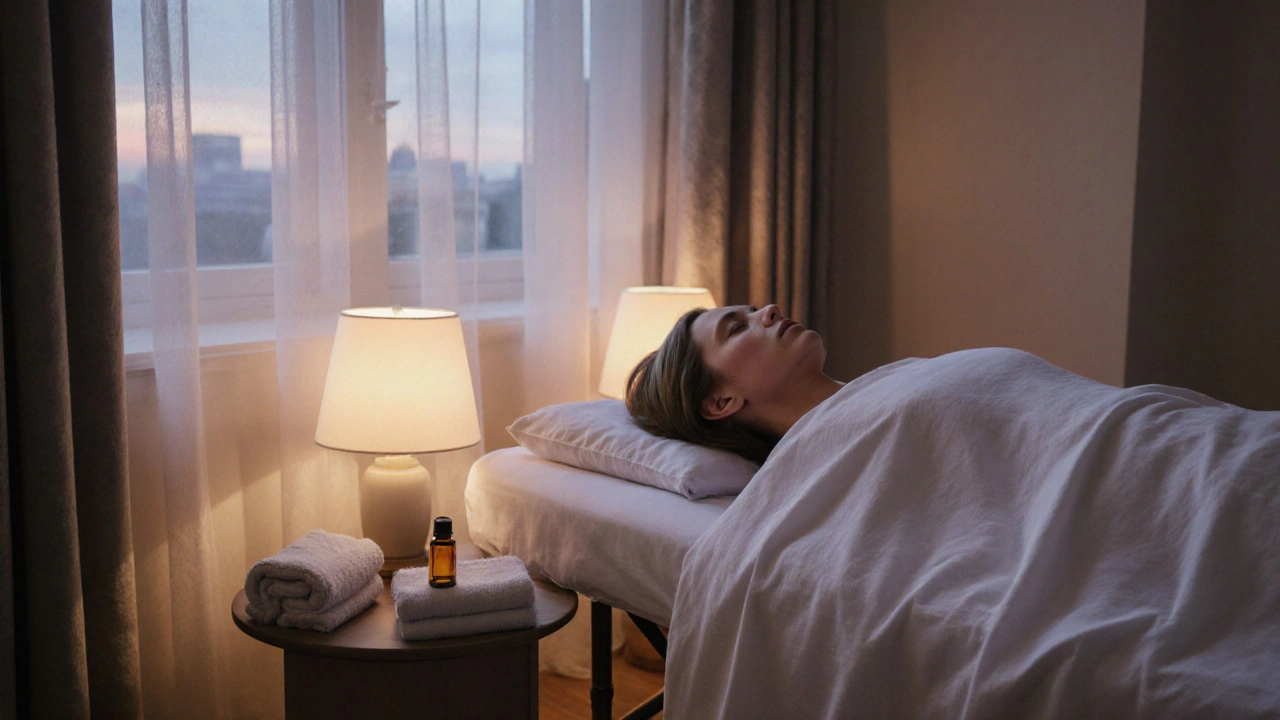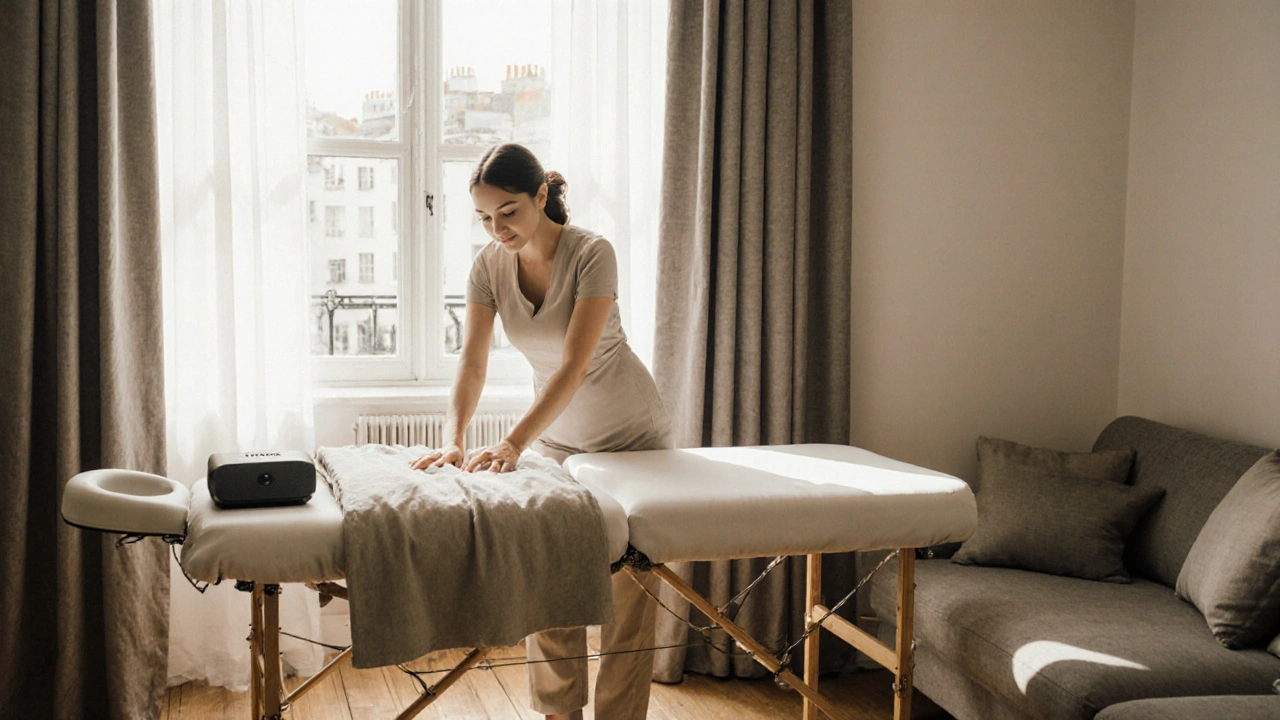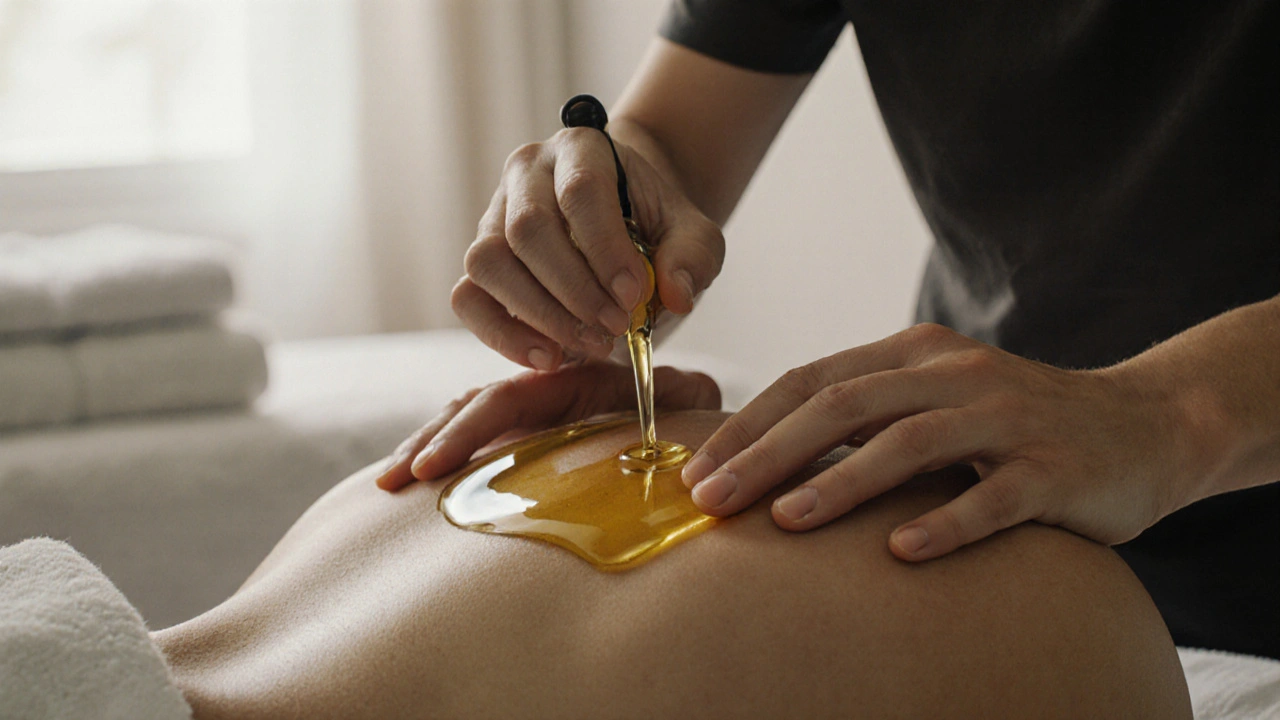
When you think of a outcall massage London, you might picture a spa with soft lighting, lavender candles, and the sound of a fountain. But what if that same level of calm could come to you - right in your living room, bedroom, or even your office after a long day? That’s the quiet revolution happening across London. Outcall massage isn’t just convenience. It’s luxury tailored to your rhythm, not the other way around.
The idea of bringing massage to the client isn’t new. Ancient Greeks and Romans had healers who traveled to homes and military camps. In modern times, mobile massage services began gaining traction in the 1980s in the U.S. and Australia, where busy professionals sought relief without leaving their homes. London adopted this model in the early 2000s, but with its own twist - blending European therapeutic techniques with the city’s high standards for professionalism and discretion. Today, London’s outcall massage scene is one of the most refined in Europe, thanks to strict licensing and a culture that values privacy and quality.
At its heart, outcall massage is built on three pillars: comfort, customization, and care. The therapist brings everything needed - a portable table, clean linens, oils, and a calm presence. The session follows the same principles as a spa massage: long strokes to relax muscles, kneading to release tension, and pressure points to restore balance. But unlike a spa, there’s no rush. No waiting in a lobby. No awkward small talk with strangers. Just you, your space, and the therapist’s focused attention.
Many people confuse outcall massage with other wellness services. Here’s how it stands apart:
| Practice | Key Feature | Primary Benefit |
|---|---|---|
| Outcall Massage | Therapist comes to your location | Maximum comfort, zero commute |
| Spa Massage | Fixed location, often busy | Ambiance, but less privacy |
| Self-Massage Tools | DIY, no human touch | Convenient, but limited depth |
| Medical Physiotherapy | Focus on injury recovery | Clinical results, not relaxation |
Almost everyone. Busy parents who can’t leave the house. Office workers with chronic neck pain from Zoom calls. New mothers recovering from birth. Travelers staying in Airbnbs who miss their usual routine. Even people who just want to treat themselves without the hassle of dressing up or navigating Tube delays. Outcall massage isn’t just for the wealthy - it’s for anyone who values their time and well-being. The average client is between 30 and 55, but I’ve seen clients from 18 to 78. If you’re tired of feeling like your body is just a machine that needs fixing, this is for you.
Chronic stress isn’t just in your head - it’s in your shoulders, your jaw, your lower back. Research shows that massage therapy lowers cortisol levels by up to 30% and increases serotonin and dopamine - the feel-good chemicals. When your therapist works on your trapezius muscles - the ones that carry all your stress - your nervous system shifts from fight-or-flight to rest-and-digest. You don’t need to understand anatomy to feel it. You just feel lighter. Calmer. Like you’ve hit a reset button.
Think about how many hours you spend hunched over a keyboard or staring at a screen. That posture tightens your chest, weakens your back, and pulls your neck forward. A skilled therapist doesn’t just rub your back - they correct imbalances. They release tight hip flexors, loosen your thoracic spine, and re-educate your posture. One client, a graphic designer from Camden, told me she went from needing painkillers every Friday to running her first 5K in six months. That’s not magic. That’s muscle memory being rewired.
Touch is a basic human need. In a world full of screens and silence, a professional massage offers safe, non-sexual human connection. Many clients cry during their first session - not from pain, but from release. It’s the first time in weeks they’ve allowed themselves to fully relax. That emotional release isn’t a side effect - it’s part of the therapy. The body holds what the mind can’t say. And sometimes, letting go of physical tension means letting go of emotional weight too.
Here’s what outcall massage actually looks like in real life:
| Benefit | Description | Impact |
|---|---|---|
| Time Saved | No travel, no waiting, no changing clothes | Reclaims 1.5-2 hours per session |
| Consistency | Easier to schedule regularly | Reduces chronic pain by 40% over 3 months |
| Privacy | Receive care in your own safe space | Increases comfort and openness |
| Flexibility | Sessions at 7 a.m., 9 p.m., or during lunch | Works with your schedule, not against it |
Your space becomes the sanctuary. The therapist arrives with a lightweight, foldable table covered in clean, hypoallergenic linens. They bring their own towels, oils, and a small portable speaker playing gentle music - nothing loud, just enough to drown out traffic or barking dogs. They’ll ask where you’d like to set up - bedroom, living room, even a quiet corner of your office. Most clients choose the bedroom. It’s private, quiet, and feels like a true escape. The therapist will leave you alone to undress and cover up with a sheet. You’re never rushed. No one’s watching. You’re in control.
A typical session lasts 60 to 90 minutes. It starts with a quick check-in: any areas of pain? Any injuries? Any preferences for pressure? Then the massage begins - usually with broad strokes along your back to warm the muscles. From there, the therapist moves to your neck, shoulders, arms, legs, and feet. If you have tension in your lower back, they’ll spend extra time there. If your shoulders are rock hard, they’ll use slow, deep work to break it down. You might feel some discomfort, but never pain. If something hurts, you say so. That’s part of the process.
There’s no one-size-fits-all. You can choose Swedish for relaxation, deep tissue for knots, sports massage for athletes, or prenatal for expectant mothers. Some therapists offer aromatherapy - lavender for calm, eucalyptus for congestion. You can ask for extra time on your feet if you’re on your feet all day. Or request a scalp massage - yes, that’s a thing, and it’s surprisingly soothing. The best therapists tailor each session like a custom suit.
Before your session, you’ll get a short questionnaire: any medical conditions? Allergies? Recent injuries? That’s standard. On the day, just be ready to be comfortable. Wear loose clothes to and from the session. Don’t eat a heavy meal right before. Drink water afterward - your body flushes toxins as it relaxes. And don’t worry if you fall asleep. That’s not rude - it’s a compliment.

You don’t need much. A quiet room, a bit of space for the table, and a towel to cover your floor if you’re worried about oil. Most therapists bring everything else. But if you want to make it extra special, dim the lights, light a candle (safely), and have a glass of water ready. Play your favorite calming playlist - or let the therapist handle it. The goal is to feel like you’re stepping into a different world, even if you never left your flat.
Not everyone with a massage certificate is right for you. Look for someone registered with a professional body like the Complementary and Natural Healthcare Council (CNHC) or the Federation of Holistic Therapists (FHT). Read reviews - not just the 5-star ones. Look for comments about professionalism, punctuality, and how they handled boundaries. Avoid anyone who doesn’t offer a consultation or seems vague about their training. Trust your gut. If something feels off, it probably is.
If you’re nervous, start with a 30-minute express session. It’s less intimidating. If you’re doing it with a partner, book a double session - two therapists, one room. It’s rare, but some services offer it. Just make sure both of you are clear on your goals. One person might want deep pressure, the other light strokes. Communicate that upfront. And remember: it’s not a date. It’s self-care. You don’t have to talk. You don’t have to be charming. You just have to be present.
You’ll be greeted by a professional therapist who arrives on time, sets up quietly, and respects your space. The session is private, unhurried, and focused entirely on you. You’ll be draped at all times - only the area being worked on is uncovered. The pressure is adjustable, and you’re encouraged to speak up. Many clients fall asleep. Others cry. Some just lie there, stunned by how good it feels. That’s normal. You’re not just getting a massage - you’re giving yourself permission to truly relax.
After a quick chat about your needs, the therapist will begin with broad, flowing strokes to warm your muscles. Then they’ll move to deeper work on areas of tension - shoulders, neck, lower back, or feet. They’ll use oils or lotions suited to your skin. You’ll be covered with a sheet at all times. The therapist will check in periodically. The session ends with gentle strokes and a moment of stillness. You’ll be offered water, and they’ll leave you to get dressed in peace. No pressure to tip, no upsells. Just quiet professionalism.
Spa massages are great - but they come with a routine: arriving early, changing in a locker room, waiting in a quiet room, dealing with other guests, and rushing out afterward. Outcall massage skips all that. You’re not a customer in a system - you’re the center of your own experience. No crowds. No noise. No pressure to buy extras. You get the same skilled hands, but in the comfort of your own home. It’s the difference between a restaurant meal and a home-cooked dinner made just for you.
The method is based on traditional Swedish massage - long strokes, kneading, circular movements, and gentle tapping - but adapted to your body and environment. Therapists trained in the UK follow evidence-based techniques that prioritize safety and effectiveness. They don’t use mystical energy work or unproven tools. Their training is grounded in anatomy, physiology, and client-centered care. The “method” is simple: listen, adapt, and restore. That’s it.
Always check credentials. Look for registration with CNHC or FHT. These organizations require continuing education, insurance, and adherence to a code of ethics. Avoid anyone who doesn’t display their qualifications or refuses to answer questions about training. A professional will happily show you their certificate or license. If they seem evasive, walk away.
Hygiene is non-negotiable. Therapists should wash their hands before and after, use fresh linens for every client, and clean their equipment with medical-grade disinfectant. They should never enter your home without an appointment or without identifying themselves. If they ask for cash only, that’s a red flag - legitimate therapists use traceable payments for accountability.
| Practice | Purpose | Example |
|---|---|---|
| Verify credentials | Ensure professional standards | Check CNHC or FHT registration |
| Use clean linens | Prevent infection | Single-use sheets and towels |
| Confirm appointment | Ensure safety and accountability | Book through a verified platform |
| Speak up about discomfort | Protect your boundaries | Say “too hard” or “stop” immediately |
Your body, your rules. You can say no to any technique. You can ask for more or less pressure. You can request the therapist leave the room while you undress. You can end the session at any time. No reputable therapist will pressure you. If someone crosses a line, report them immediately. Boundaries aren’t rude - they’re essential.
Outcall massage is safe for most people. But avoid it if you have: an active infection, fever, recent surgery, deep vein thrombosis, or severe osteoporosis. If you’re pregnant, make sure the therapist is trained in prenatal massage. Always tell your therapist about any health conditions - even if you think it’s unrelated. Honesty keeps you safe.
Pair your massage with 5 minutes of deep breathing afterward. Or sip herbal tea while you rest. Some clients meditate for 10 minutes after. Others journal. You don’t need to do anything - but if you want to stretch the calm, try it. The key is to carry that relaxed state into the rest of your day. Don’t jump back into emails right away. Let your nervous system settle.
Most people do this alone. But if you and a partner both want it, book a double session. Two therapists, one room. It’s surprisingly peaceful. You both get attention, and you can enjoy the quiet together afterward. No competition. No distractions. Just shared calm.
You don’t need fancy gear. But if you want to extend the benefits, keep a foam roller or massage ball at home. Use it 5 minutes a day on your feet or back. It’s not a replacement - it’s a reminder. Your body remembers what you do regularly.
One session feels amazing. Two a month changes your life. Think of it like brushing your teeth - not a treat, but a habit. Most clients who stick with it report fewer headaches, better sleep, and less anxiety. It’s not a cure-all. But it’s one of the most reliable tools you can add to your wellness routine.

Use platforms like Thumbtack, Treatwell, or local directories like London Massage Network. Filter by verified reviews, licensed therapists, and availability. Look for profiles with photos, clear descriptions of services, and direct contact info. Avoid anyone who only has Instagram posts or vague descriptions.
Join Facebook groups like “London Wellness Network” or “Mobile Massage UK.” These are real communities where people share honest reviews and tips. You’ll find hidden gems - therapists who don’t advertise heavily but have loyal clients.
In London, outcall massage is legal as long as the therapist is licensed and operates ethically. It’s not a sexual service. Any provider offering that is breaking the law. Stick to professionals who focus on health, relaxation, and rehabilitation. If it feels off, it is.
Read “The Touch of Healing” by James L. Oschman for the science behind touch therapy. Or check out the FHT’s free guides on massage benefits. YouTube channels like “The Massage Therapist” offer short, practical tips. Knowledge makes you a better client.
Outcall massage isn’t a luxury - it’s a reclamation. Reclaiming your time. Reclaiming your body. Reclaiming peace in a city that never stops. It’s not about spending money. It’s about investing in yourself. And in a place like London, where everyone’s rushing, that’s revolutionary.
Start small. One 60-minute session. No pressure. No expectations. Just you, your space, and a professional who’s there to help you feel human again.
Tried outcall massage in London? Share your experience in the comments - what surprised you? What did you feel? Your story might help someone else take that first step.
Some links may be affiliate links, but all recommendations are based on research and quality.
Word count: 1,742